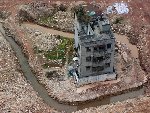乌坎实践说明民主并不能替代一切
问政风暴(13-12): 乌坎实践说明民主并不能替代一切
彭澎接受《南华早报》采访
题外话:乌坎的维权和选举实践表明,民主与利益结合,村民也会支持,但当民主暂时带不来利益实惠时,村民对民主也会缺乏耐心的。而经选举产生的村官,除了民选优势之外,一缺经验,二缺关系(尤其是与政府、与前任及其代表的利益集团的关系)。这样,土地问题的解决必然不顺利,而这正是其对立面希望看到的!
Wukan democracy leaves village divided
Friday, 15 February, 2013, 12:00am
Teddy Ngteddy.ng@scmp.com
Wukan village committee head Lin Zuluan. Photo: Dickson Lee
Some elected leaders of a Guangdong village renowned for its democratic elections say the village is not ready for the democracy its residents aggressively aspired to a year ago.
Villagers in Wukan, Lufeng county, were in a festive mood in March, as they were finally able to vote in the election of a seven-member village committee after months of struggles and confrontations with authorities because of illegal land grabs.
The participants hailed their protests as an effective model for people across the mainland facing similar situations.
However, almost a year later, there appears to be growing resentment between the elected leaders and villagers, while the land issues have not been resolved, triggering doubts about the feasibility of democratic rule.
"We are not satisfied," said one villager. "We removed corrupt officials to get our land back, but have received nothing, and the new village committee has not given us an explanation."
We removed corrupt officials to get our land back, but have received nothing, and the new village committee has not given us an explanation
The frustration is in stark contrast to the uplifting mood among the thousands of villagers when they took to the streets to protest against what they said was the illegal seizure of 446 hectares of land.
One villager, Xue Jinbo , was taken away by police during the protests and died in custody, but villagers persisted, believing that democratic elections would solve their problems.
Lin Zuluan , 69, was elected head of the village committee. But now he says that, while democratic governance was worth trying, he regrets taking part in the campaign, because villagers have unrealistic expectations of their leaders.
"I am old," Lin said. "I can't stand the pressure and fulfil all of their expectations. I've gained nothing from the whole campaign; I should not have taken part in it. Democracy is something that all people should pursue, but the implementation of it should be gradual, and there should be an environment that is conducive to it. We can't let it happen overnight."
Lin also said the villagers were not clear about their rights and had raised "unreasonable" demands, such as asking the committee to publicly release every detail of contracts it signs.
Deputy village chief Yang Semao said villagers believed that all the land taken from them would be returned after the election. But he pointed out that the land transactions had already been finalised before the elected leaders took office, leaving them with their hands tied.
"Some villagers even said that violence was justified in getting back their land," Yang said. "They suggested kicking out the people who bought the land, and demolishing the structures built there."
He said villagers were concerned only with their land and would support anyone promising to return it to them, regardless of whether the leader was elected democratically.
"The villagers don't care how the leaders are picked," Yang said, "and it is feared that future village committees will be appointed politically, instead of through elections."
Young local activist Zhang Jianxing said democracy "has gone too far", and that "some villagers believe they can do whatever they want".
Despite the divisions, all of the village leaders and activists say last year's protests have yielded some positive results.
Zhang noted that the committee's actions had at least stopped illegal land sales from continuing, and Yang said that "short-term chaos" was inevitable to ensure a better future.
Meanwhile, Shanghai-based Dragon TV reported that democracy in Wukan was facing difficulties, and the report was published again on the website of the People's Daily.
State media once made high-profile reports on how Guangdong party chief Wang Yang defused tensions in the village by allowing the elections.
Beijing-based political commentator Zhang Lifan said the Dragon TV report did not necessarily indicate a shift in the official assessment of Wukan's governance, but Zhang added that it "certainly reflects the thinking of some officials, that the village cannot be properly managed even with democracy".
Peng Peng , a researcher at the Guangzhou Academy of Social Sciences, said the crux of the problem was not whether democracy should be implemented, but about the lack of professional politicians.
"We can't say democracy is wrong just because some problems have occurred," he said. "Taiwan also faces a lot of problems, but no one says the island should not have democracy."
Zhang Lifan said villagers were not educated in concepts of civil rights and responsibilities, and it would take time for them to grasp the meaning of democracy.
上一篇:全球资本主义之谜
下一篇:部-级-高-官有多牛?五家单位任博-导
·山东潍坊悬赏地下排污线索 两天排查715家企业2013.02.18
·浙江商人悬赏20万邀环保局长下河游泳 局长一笑置之2013.02.18
·多地出台规范严禁以人查房 房屋信息查询管制日趋严格2013.02.18
·传动车D3214因超载出故障抛锚1小时 旅客被赶下车2013.02.18
·四川崇州反贪局长坠亡 警方确定系跳楼身亡2013.02.18
·湖南娄底房管局春节自行放假10天 称国务院好遥远2013.02.18
 张歆艺写真 黑纱透视裙跳芭雷高贵
张歆艺写真 黑纱透视裙跳芭雷高贵 盘点地道新疆美食全攻略
盘点地道新疆美食全攻略 激情碰撞 美女车内演绎激情时刻
激情碰撞 美女车内演绎激情时刻 这个美女好冷 车模野外写真图集
这个美女好冷 车模野外写真图集 广州杨箕村村民挖
广州杨箕村村民挖 高原雪山上演比基
高原雪山上演比基 “活”在现代文明
“活”在现代文明 地球的呼吸盘点世
地球的呼吸盘点世